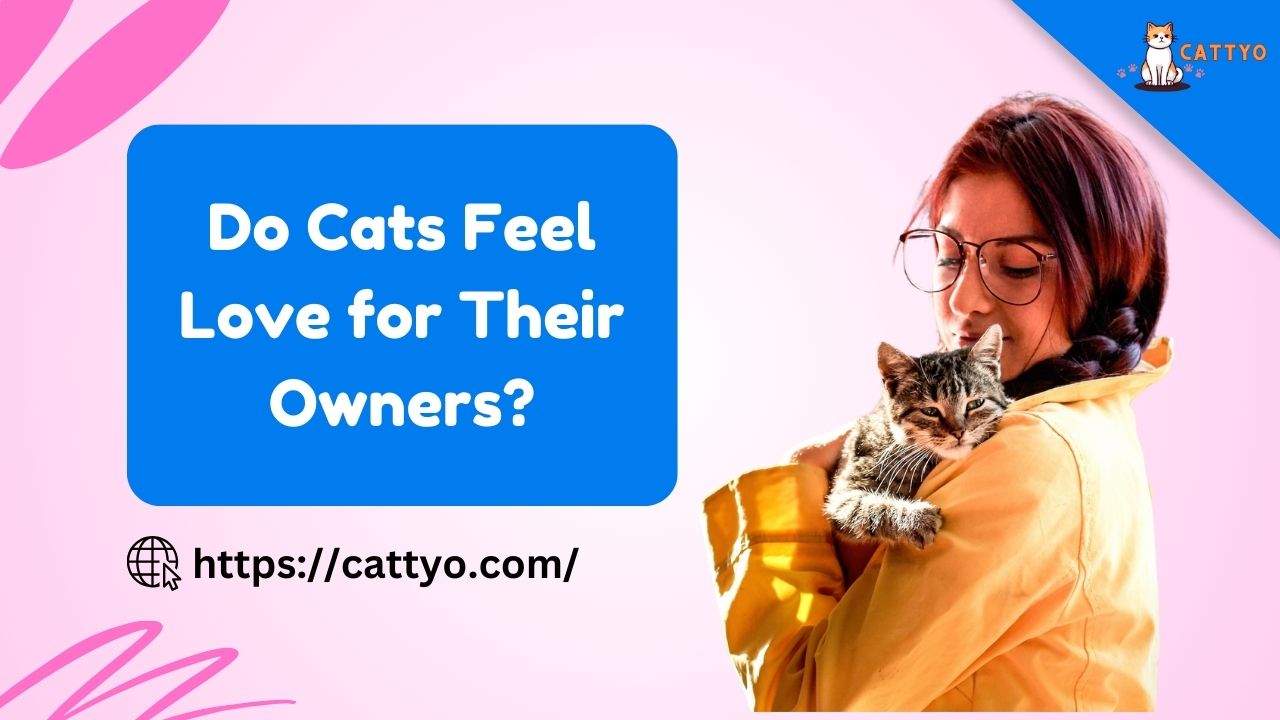Cats are mysterious little creatures, aren’t they? One minute, they’re purring in your lap, and the next, they’re staring at you like you’ve committed the cardinal sin by simply existing in the same room.
It leaves you wondering: do they really love us? Or are we just a source of food and warmth to them?
It’s a question many cat owners have pondered as they watch their feline friends bat at their shoelaces or curl up beside them on the couch. Some say cats are aloof, indifferent creatures who only tolerate humans for the occasional treat.
Others believe their bond with their owners runs deep—maybe even deeper than we give them credit for. But what’s the truth?
Let’s dive in and explore the fascinating world of feline affection.
Do Cats Feel Love for Their Owners?
Yes, cats do feel love for their owners, but their way of expressing it differs from other pets like dogs. While cats may not show overt affection in the same way, they form deep bonds with their human companions. Their behaviors often reflect trust, attachment, and affection. Check the Some Key Points for Better Understanding about Do Cats Feel Love for Their Owners in below.
- Purring:
Cats often purr when they’re near their owners, especially during moments of relaxation or comfort. This is a sign of contentment and affection. - Rubbing and Kneading:
Cats may rub against their owners or knead their lap. This behavior mimics kittenhood and is a sign of affection, showing they trust you and consider you part of their “family.” - Following You Around:
Cats who follow their owners around or wait for them to return are showing attachment. This behavior indicates that they enjoy your company and feel secure with you. - Slow Blinking:
When a cat gives you a slow blink, it’s a sign of love and trust. It’s often referred to as “cat kisses,” indicating that the cat feels safe and relaxed around you. - Bringing “Gifts”:
Cats may bring you small presents, like a dead animal or toy, as an offering. This behavior is often linked to their instinct to share with loved ones. - Licking:
Cats may lick their owners to show affection, as grooming is a sign of bonding among cats in the wild.
While cats show love in more subtle ways, their actions demonstrate strong emotional connections to their owners.
Cats and Love: Are They Just Using Us for Snacks?
Before we go all soft and sentimental, let’s be real for a second: cats are a little self-serving. They’ve figured out how to manipulate their human servants into providing everything they need, from food to a cozy bed, and let’s not forget the constant belly rub requests.
In many ways, a cat’s affection often seems to have a transactional edge. But that doesn’t mean they don’t feel a bond with their humans.
Think about it: have you ever returned home to a cat who practically knocks you over with excitement (or at least rubs against your leg, purring wildly)? If that doesn’t scream “I’ve missed you!” I don’t know what does.
It’s not like they’re doing this to get a treat or a new scratching post—there’s clearly some emotional connection involved.
How Do Cats Show Love?
Unlike dogs, who might wag their tails or jump on you when they’re happy, cats have their own, more subtle way of showing affection. Here are a few ways your cat might be telling you, “Hey, I love you”:
- Affectionate Sounds: The quintessential sign of a happy, content cat. If your cat purrs when it’s near you, there’s a good chance it feels comfortable and bonded with you. A cat’s purr is its version of a love song—soft, soothing, and full of affection.
- Rubbing: You’ve probably seen your cat kneading your lap with its paws, especially when it’s extra cozy. This is a throwback to kittenhood, when cats would knead their mother’s belly to stimulate milk flow. It’s a sign your cat feels safe and relaxed with you—basically, they’re saying, “You’re my person.”
- Soft Eye Blinks: A cat’s slow blink is often referred to as a “cat kiss.” When they blink slowly at you, it’s like them saying, “I trust you” or “I love you.” It’s their way of showing affection without the drama of a dog’s enthusiastic tail wag.
- Offering Surprises: Okay, this one might be a little unsettling at times (especially if it’s a half-eaten mouse), but when your cat brings you a “gift,” it’s showing you love in its own strange way. It’s a cat’s way of saying, “Look what I caught for you! Aren’t you proud?” In a weird, primal way, it’s a sign of affection.
- Following Your Every Move: Ever notice how your cat will follow you from room to room, even when you don’t have food in hand? They’re not just curious—they’re attached. Cats bond with their owners, and following you around is a sign they want to be near you.
The Science Behind It: Do Cats Feel Love?
Alright, let’s throw in some science to back up our warm fuzzy feelings. Research has shown that cats do indeed form bonds with their humans. A study by the University of Lincoln found that cats are capable of forming strong attachments to their owners, much like the attachment children have to their parents.
They don’t just see us as sources of food—they see us as their safe place. Cats also produce oxytocin—the so-called “love hormone”—when interacting with their owners. So, while they may not love us in the same way a dog does, they certainly feel an emotional connection.
But Why Do They Act So Aloof?
Let’s face it—sometimes it feels like your cat can’t be bothered. They’ll give you that side-eye, and it’s like they’ve completely forgotten that you’re their personal chef and bed provider. But here’s the thing: cats are more independent by nature.
Unlike dogs, which evolved to be pack animals, cats were solitary hunters for most of their evolutionary history. So, when your cat isn’t constantly showering you with affection, it doesn’t mean they don’t love you—it just means they’re respecting their inner “cool cat” persona.
Real World Example: The Tale of Mr. Fluffy
Take Mr. Fluffy, a particularly aloof tabby I once knew. He would occasionally allow me to pet him—on his own terms—and would sit on the windowsill for hours, gazing out at the world like he was pondering the mysteries of the universe.
Yet, when I’d come home after a long day, Mr. Fluffy would trot over to greet me at the door with a soft meow, rub against my legs, and then proceed to flop down on my lap as though he had been waiting for this moment all day.
He wasn’t a lap cat, but that moment—when he settled in with a purr—was his version of a hug. It was his way of saying, “I’m here, and I like you.” It didn’t look like the big, showy affection I’d get from a dog, but it was love, all the same.
Table Of Signs Your Cat Loves You
Cats do feel love for their owners, though their expressions of affection are more subtle compared to other pets like dogs. While cats may not show overt displays of emotion, they form strong, emotional bonds with their human companions.
Their love is often shown through actions such as purring, kneading, slow blinking, following their owners, and other behaviors that indicate trust and comfort.
Cats’ unique ways of expressing love reflect their independent nature, but these behaviors prove that cats can indeed experience affection and attachment towards their owners. The following table highlights common signs that demonstrate your cat’s love for you.
| Sign | What It Means |
|---|---|
| Purring | Content, happy, and bonded with you |
| Kneading | Comfort and trust—like a “cat hug” |
| Slow Blinking | A “cat kiss” or a sign of trust and affection |
| Following You Around | Wanting to be near you, showing attachment |
| Bringing You Gifts | A sign of love and care (even if it’s a bit gross!) |
FAQs On Do Cats Feel Love for Their Owners?
Q: Why does my cat ignore me sometimes?
Cats are naturally independent creatures. If your cat isn’t constantly showering you with attention, it doesn’t mean they don’t love you. They’re just respecting their need for space. But when they do seek you out, it’s a sign that they feel connected to you.
Q: Can cats get jealous?
Yes! Cats can show signs of jealousy, especially if they feel their territory (or you) is being threatened by another pet. If your cat suddenly starts acting out or becomes clingy, it might be because they’re feeling a little insecure.
Q: Do cats miss their owners?
Absolutely! Cats can form strong emotional bonds, and they definitely miss their owners when they’re gone. The excitement they show when you return is a clear sign of their affection.
End Note
So, do cats feel love for their owners? The answer is yes—just in their own unique, independent way. They may not shower us with affection the way dogs do, but cats definitely form strong emotional connections.
Well, it’s through a soft purr, a slow blink, or a gentle knead, your cat is likely showing you its own version of love. And let’s be honest, we wouldn’t have it any other way, would we?






